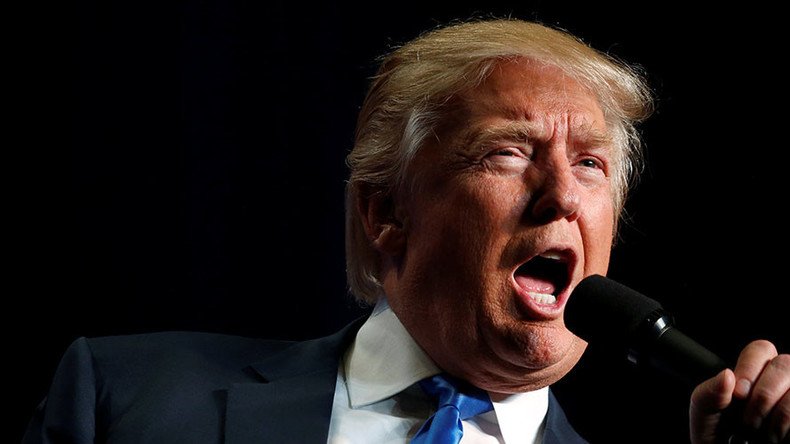1/3 pro-Trump & 1/5 pro-Clinton tweets boosted by bots – study

From the 9 million Tweets generated during the first US presidential debate, analysis found that nearly 2 million of them were pro-Trump compared to just over 600,000 pro-Clinton. Over one-third of those for Trump were generated by bots, whereas just one-fifth came from bots for Clinton.
“Twitter traffic on pro-Trump hashtags was more than twice that of pro-Clinton hashtags [and] one third of pro-Trump twitter traffic was driven by bots and highly automated accounts, compared with one-fifth of the pro-Clinton Twitter,” according to a new Oxford University study titled, “Bots and Automation over Twitter during the First US Presidential Debate.”
Bots May Be Contributing to Trump's Post-Debate Success: About a third of pro-Trump tweets after the first de... https://t.co/o6BrWXu6AR
— KOBIE PROCTER / TPG (@procternyc) October 18, 2016
The study’s authors, led by Professor Philip Howard, warn that such software has the capacity to “manipulate public opinion” and “muddy political issues.” The study is part of a wider project exploring “computational propaganda.”
For the study, researchers identified 9 million tweets generated during the first US Presidential Debate on September 26 and for three additional days after. From that sample they identified over 2.0 million tweets using hashtags like #MakeAmericaGreateAgain and #ImWithHer or the candidate’s names during the debate. From that sample over 1.8 million were pro-Trump, twice that of pro-Clinton with 613,000 tweets.
Researchers then analyzed these tweets to identify which were generated by bots, which means tweeted at least 50 times a day across the period, meaning a minimum of 200 tweets over the four days. Bots are social media computer-generated programs that post, tweet or message of their own accord.
The results suggested that 32.7 percent of such pro-Trump tweets had been posted by bots, and 22.3 percent of such pro-Clinton ones. A total of 576,000 tweets favored Trump, whereas 137,000 favored Clinton.
Turns out some #Trump supporters actually don't have a brain. Bots were behind 576,00+ pro-Trump tweets in 5 days: https://t.co/Iu3mQrTJGlpic.twitter.com/qS87lWEsXu
— Harriet Salem (@HarrietSalem) October 18, 2016
“On the balance of probabilities, if you pulled out a heavily automated account the odds are four to one that you’ll find it’s a bot tweeting in favor of Trump," said Professor Howard, according to the BBC.
Professor Howard said they are not looking at the source for the bots “merely the metrics of the data.”
Can 'Bots' control what we talk about on #Twitter? 4x as many tweets by automated accounts for #Trump than #Clinton. https://t.co/P04yWZQQw5pic.twitter.com/u5QaNovbI5
— Table19 (@WeAreTable19) October 18, 2016
The study also found that those accounts that tweeted neutral hashtags, or a mix of different kinds, all 23 percent were driven by bots.
Critics of the study said real people can write a script and use an algorithm to tweet regularly with specific responses.
“Humans can tweet content that looks almost identical to a series of bots flooding a political hashtag,” said Caroline Sanders, an ex-IBM researcher who now works for Buzzfeed. “Also political commentators or people eagerly engaged in the political debate could also tweet this many times.”
‘She’s getting pumped up’: #Trump calls for drug tests before next debate (VIDEO) https://t.co/uPZ73mIvkv
— RT America (@RT_America) October 15, 2016
Professor Howard disagreed about the human influence “most heavy automation and tweets happened overnight and shares similar hashtags and information.”
Researcher said bots can be spotted because their bot profiles lack basic account information such as screen names or profile pictures. The study said the appeal of bots is that they “versatile, cheap to produce and ever evolving.”
Obama tells Trump to stop ‘whining’ over attempts to discredit the election, says no evidence of widespread fraud https://t.co/2pNyW9VRCKpic.twitter.com/B1sO1r9vvS
— RT America (@RT_America) October 18, 2016
Researchers have noticed that political bots are being used more frequently on public policy issues, they can be used to manipulate opinion, choke off debate, and muddy political issues and are increasingly being deployed during political crises and elections.












